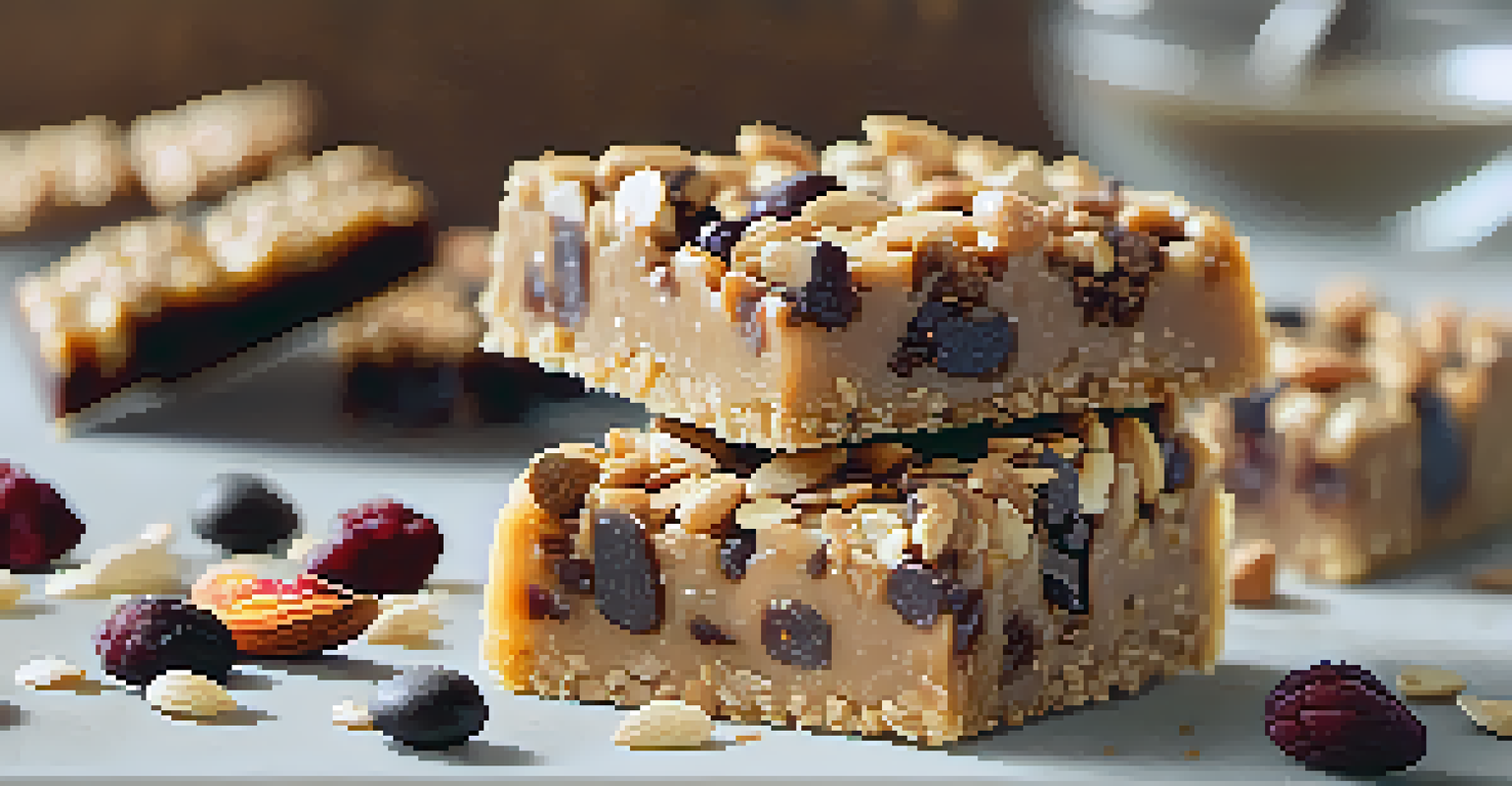Protein Bars: Convenient Nutrition for Bodybuilders

What Are Protein Bars and Their Benefits?
Protein bars are compact snacks packed with protein, designed to support muscle recovery and growth. For bodybuilders, these bars serve as a convenient source of nutrition, especially when on the go. They typically contain a mix of proteins, carbohydrates, and sometimes healthy fats, making them a versatile addition to any diet.
Let food be thy medicine and medicine be thy food.
One of the main benefits of protein bars is their convenience. Whether you're at the gym, traveling, or simply too busy to prepare a meal, a protein bar can easily fit into your routine. Many bars are also formulated to be low in sugar and high in fiber, offering a healthier alternative to traditional snacks.
Additionally, protein bars can help bridge the gap between meals, ensuring that your body receives the nutrients it needs throughout the day. For those intense workout sessions, having a protein bar handy can help maintain energy levels and support muscle synthesis post-exercise.
How to Choose the Right Protein Bar
With the market flooded with protein bars, selecting the right one can feel overwhelming. Start by reading the label to check the protein content; most bodybuilders aim for bars with at least 15 grams of protein per serving. It's also crucial to consider the source of protein—whey, casein, or plant-based options all have unique benefits.

Next, pay attention to the sugar content. While a little sweetness is often used for flavor, too much sugar can counteract your fitness goals. Look for bars that have minimal added sugars or natural sweeteners to keep your snack healthy and effective.
Protein Bars: Convenient Nutrition
Protein bars offer a portable and nutritious option for those needing quick energy and muscle recovery.
Lastly, consider your dietary preferences and restrictions. Whether you're vegan, gluten-free, or following a specific diet, there are protein bars tailored to meet various needs, making it easier to find one that fits your lifestyle.
Timing: When to Eat Protein Bars
Timing can be just as crucial as the type of protein bar you choose. Many bodybuilders find it beneficial to consume a protein bar within 30 minutes after their workout to aid in muscle recovery. This post-workout window is essential for replenishing energy and kickstarting the recovery process.
You are what you eat, so don't be fast, cheap, easy, or fake.
You can also enjoy a protein bar as a meal replacement or a mid-morning snack. If you're short on time, they can provide a quick and nutritious option that helps keep your metabolism steady. Just remember to balance your overall diet with whole foods as well.
Additionally, using protein bars as a pre-workout snack can help fuel your workout. A bar rich in carbohydrates can give you the energy boost needed to power through those challenging sessions, ensuring you're at your best when it matters.
Popular Protein Bar Ingredients Explained
Understanding the ingredients in protein bars can help you make informed choices. Common ingredients include whey protein, which is derived from milk and is quickly absorbed by the body, making it a favorite among bodybuilders. There are also plant-based proteins, such as pea or brown rice, ideal for those who prefer vegan options.
Many protein bars include added fibers, like inulin, which aids digestion and keeps you feeling full longer. Healthy fats, such as nut butters or seeds, are often included to provide sustained energy and help balance macronutrients.
Choosing the Right Protein Bar
Selecting a protein bar involves checking protein content, sugar levels, and dietary preferences to meet your needs.
Lastly, some bars contain vitamins and minerals to enhance their nutritional profile. These added nutrients can support overall health, making protein bars not just a snack but a more comprehensive dietary supplement.
Homemade Protein Bars: A Simple Alternative
For those who prefer control over their ingredients, making homemade protein bars can be a fun and rewarding experience. By combining oats, protein powder, nut butter, and your choice of sweetener, you can customize your bars to suit your taste and dietary needs. Plus, it can be more cost-effective than purchasing pre-packaged options.
Creating your own bars allows you to experiment with flavors and textures. You can add ingredients like dried fruit, chocolate chips, or seeds to enhance taste and nutrition. The versatility of homemade bars means you can adjust the protein content according to your goals.
Storing homemade protein bars is also straightforward. Just cut them into portions and keep them in the fridge or freezer for quick access throughout the week. This way, you always have a healthy snack available when hunger strikes.
Protein Bars for Weight Management
Protein bars can play a significant role in weight management for bodybuilders and fitness enthusiasts alike. When included as part of a balanced diet, they can help control hunger and reduce the urge to snack on unhealthy options. The high protein content can promote feelings of fullness, making it easier to stick to your dietary goals.
Incorporating protein bars into your meal plan can also assist in maintaining muscle mass while losing fat. Protein is essential for muscle repair and growth, and a protein bar can provide a quick source when you need it most. This balance is crucial for those looking to sculpt their physique.
Homemade Bars for Custom Nutrition
Making homemade protein bars allows for control over ingredients and customization to fit personal taste and dietary goals.
However, it's important to use protein bars mindfully. While they can support weight management, relying solely on them without a variety of whole foods can lead to nutritional deficiencies. Aim for a balanced approach that includes a diverse range of nutrients.
The Future of Protein Bars: Trends to Watch
The protein bar market is evolving, with emerging trends that cater to the needs of health-conscious consumers. One notable trend is the rise of cleaner labels—bars with minimal processing and fewer artificial ingredients are gaining popularity. This shift reflects a growing demand for transparency in food products.
Another trend to watch is the incorporation of functional ingredients, such as adaptogens or superfoods. These additions not only boost nutritional value but also offer potential health benefits, such as stress reduction or enhanced immunity, making them appealing to a broader audience.

Sustainability is also becoming a key factor, with more brands focusing on eco-friendly packaging and sourcing ingredients responsibly. As awareness around environmental issues increases, protein bars that prioritize sustainability may become the go-to choice for many fitness enthusiasts.